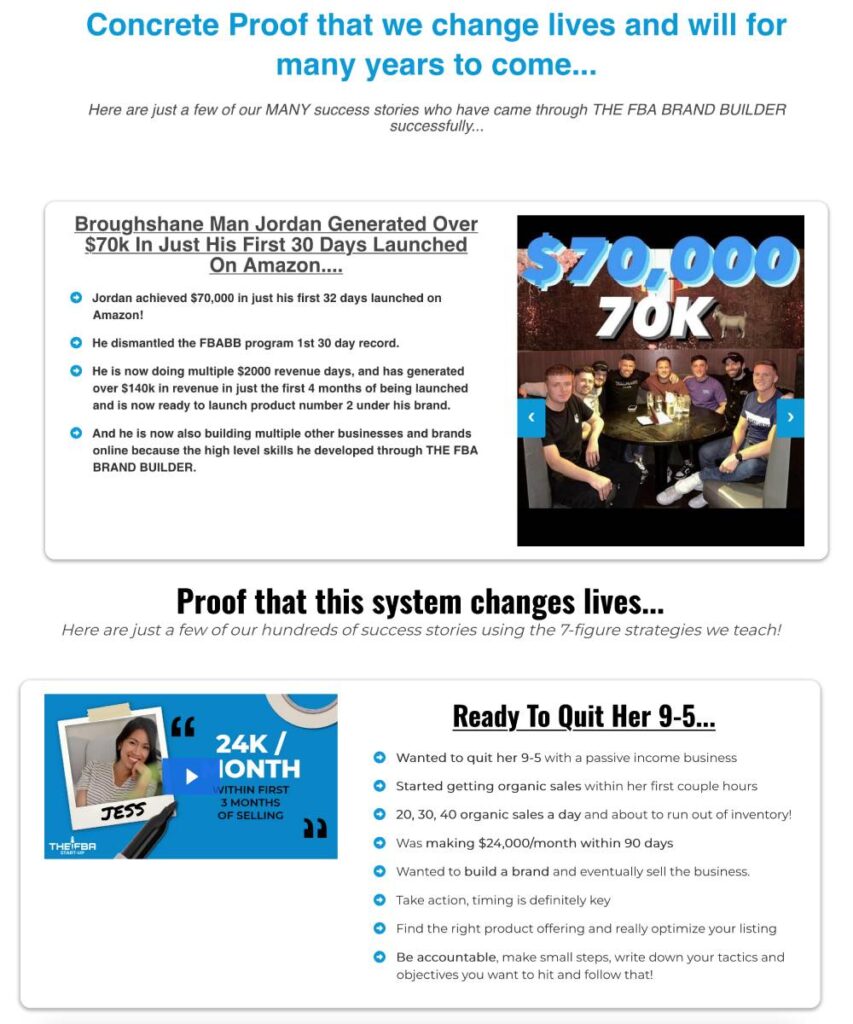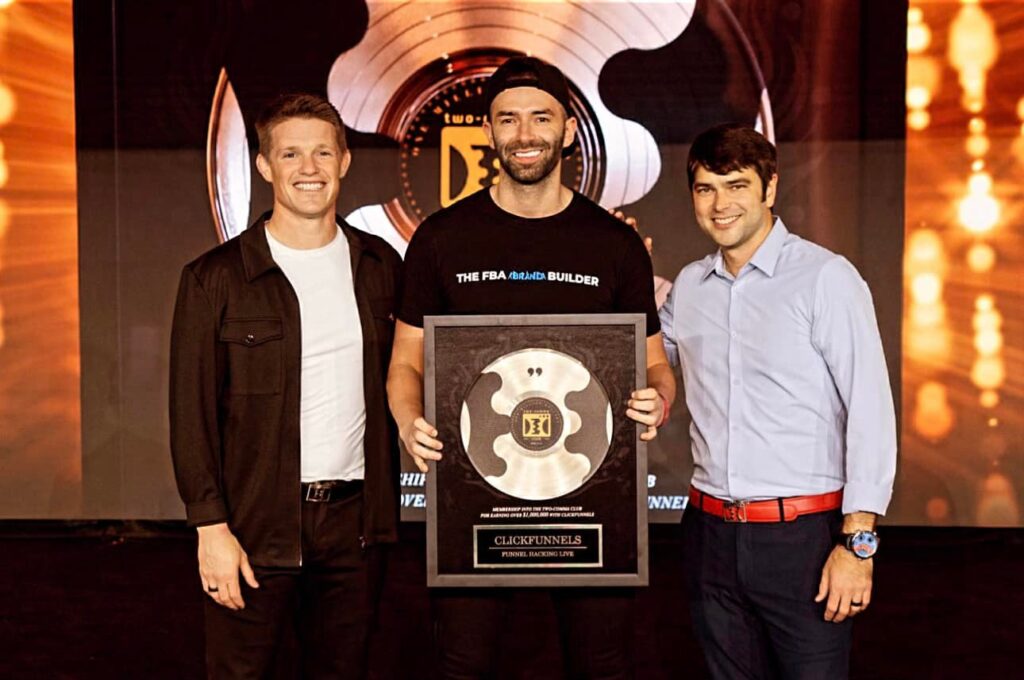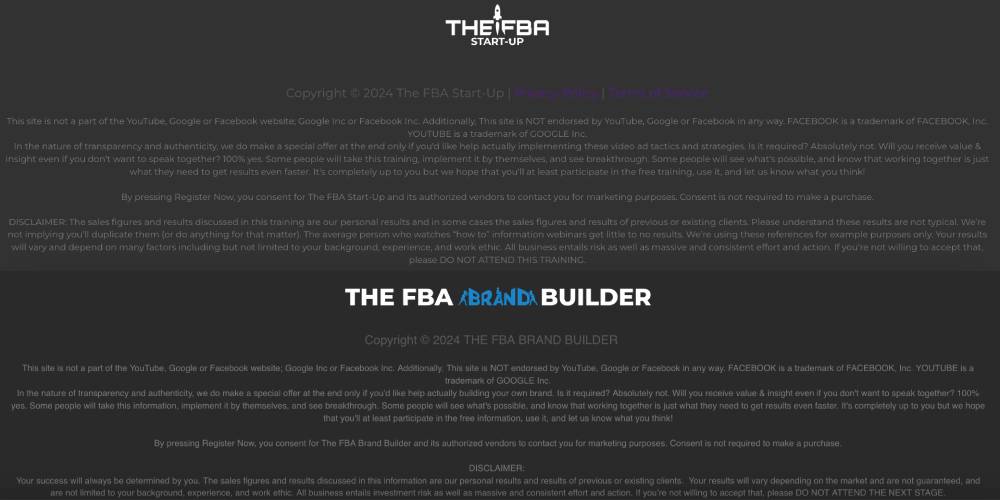You’ve probably come across Darren Campbell’s FBA Brand Builder if you’ve ever looked into making money online. The pitch? Financial freedom, more family time, and a thriving business you can run from your laptop. Pretty tempting, right?
But here’s the thing—Darren’s program isn’t the only one making those promises. Programs like the Zab Twins’ Amazon FBA course have striking similarities, and they’re not alone. There seems to be a web of these courses that all feel oddly connected. Let’s break it down.
The Language: Is It Original?
A big part of these programs’ appeal is the inspirational, almost rags-to-riches messaging. Darren’s FBA Brand Builder constantly hammers home the promise of life-changing success:
- “Making thousands of pounds a month from your laptop is now 100% REAL…POSSIBLE.”
- “Building my brand unlocked a new level of time and freedom that I’ve never dreamed possible.”
Now compare that to what the Zab Twins are saying:
- “How We Built a 7-Figure Amazon Business From Scratch (In Less Than a Year) Using ‘Product Clusters.’”
- “This system changes lives... here’s proof from our hundreds of success stories!”
Sound familiar? Both programs talk about quitting the 9-to-5 grind, making huge profits quickly, and transforming lives.
The overlap in language isn’t just a coincidence; it feels like they’re reading from the same script.
Identical Website Design and Wording: Both websites use the same tone, calls to action (“Hit Play”, “YES! I’d Like to Learn More”), and layout. Even the success stories follow the same storytelling template, with only minor tweaks to details like names, locations, or products.
The Same Marketing Funnels: Offering “free training” as a teaser for an upsell is a hallmark of these programs, with nearly identical processes for capturing leads and converting them into paying customers.

Marketing: A Copy-and-Paste Playbook
The similarities go beyond words. Darren and the Zab Twins both rely on professionally produced videos shot with what appears to be the same background. The same filming location for promotional videos isn’t just a stylistic coincidence—it could be part of a package provided by whoever created this system.
They highlight flashy testimonials of people achieving $10K days, quitting their jobs, or making six figures in record time. The striking similarities in the program structure, website design, and even testimonials suggest that these programs are using a pre-packaged system.
The messaging in these testimonials is also suspiciously aligned. Darren’s site features a client who “hit $70K in 30 days,” while the Zab Twins showcase someone who achieved “$30K in their first 30 days.” It’s the same formula: focus on rapid success and big numbers.
Both programs also push ClickFunnels—a popular platform for building sales funnels. While there’s nothing inherently wrong with using ClickFunnels, the shared approach raises questions about whether they’re working from the same centralized blueprint.

A Network of Similar Programs
Darren Campbell and the Zab Twins aren’t the only names in the Amazon FBA coaching space. Other programs promoting strikingly similar strategies and success stories follow an almost cookie-cutter approach. Their websites share not just a niche but also familiar structures, marketing language, and layouts. While this might suggest a shared foundation, some elements—like the disclaimers in their footers—seem to follow a more generic template frequently seen on ClickFunnels-powered sites.
Take, for instance, the footer on the Zab Twins’ site: “Results are not guaranteed. Individual success depends on your own efforts.”
Compare that with Darren’s: “The results displayed are not typical. Building a brand takes hard work and dedication.”

At first glance, these disclaimers could seem like a direct copy-paste, but this kind of language is common across ClickFunnels pages. While it doesn’t confirm deeper connections, it underscores how much of this space relies on standardized structures and messaging.
The technical setup of these websites adds another layer to the conversation. Most of the domains, including thefbabrandbuilder.com and zabtwins.com, are registered through GoDaddy and use similar name servers, such as ns67.domaincontrol.com and ns68.domaincontrol.com. This shared infrastructure hints at some level of connection, although it could also reflect standard hosting practices.
While there’s no definitive proof of shared ownership or coordination, the consistent website structures, overlapping disclaimers, and centralized hosting are hard to ignore. Whether these similarities point to a coordinated effort or simply a reliance on well-worn industry formulas, they raise questions about how transparent these programs are and what’s really going on behind the scenes.

A Shared Playbook, but Does It Deliver?
The Zab Twins’ FBA Startup course shares striking similarities with Darren Campbell’s FBA Brand Builder. Both promise a "blueprint" for Amazon FBA success, claiming to guide beginners to six-figure incomes. But look closer, and the cracks start to show.
For starters, neither program discloses its full price upfront. The Zab Twins recommend having at least $4,000 in capital, and rumors suggest course fees exceed $5,000—similar to Darren’s setup. Both lean heavily on private labeling, which sounds simple but is riddled with challenges: a saturated market, razor-thin profit margins, and grueling hours spent on product research, branding, and inventory management.
| Feature | Darren Campbell’s FBA Brand Builder | Zab Twins’ FBA Startup |
|---|
| Course Focus | Amazon FBA private labeling and branding. | Amazon FBA private labeling and branding. |
| Pricing Transparency | Pricing not disclosed upfront. Requires a call to learn costs. | Pricing not disclosed upfront. Call required for details. |
| Recommended Capital | Estimated $4,000+ startup capital, similar to competitors. | $4,000+ recommended startup capital. |
| Coaching | Weekly group coaching sessions led by Darren and team. | Weekly group and one-on-one coaching sessions with the Zab Twins. |
| Success Guarantees | No guarantees of success; disclaimers highlight hard work required. | No guarantees of success; emphasizes effort and individual results. |
| Refund Policy | No clear refund policy mentioned. | No refund policy publicly stated. |
| Community Access | Exclusive community for students to network and share insights. | Access to a private online community for Amazon FBA sellers. |
| Marketing Approach | Heavy focus on breaking free from 9-to-5 and financial freedom. | Heavy focus on financial freedom and achieving “six figures.” |
| Blueprint Similarity | Claims to offer a unique system but closely mirrors competitors’ methods. | Promotes a tested “blueprint,” which resembles other FBA courses. |
| Transparency Concerns | Uses general disclaimers about success, making independent verification difficult. | Similar disclaimers, limited proof of results beyond curated testimonials. |
| Additional Notes | Incorporates ClickFunnels for landing pages and automation. | Also heavily reliant on ClickFunnels for course infrastructure. |
Critics of the Zab Twins have pointed out that “success is not guaranteed,” and some have called attention to the lack of transparency: “Their pricing is hidden, and there’s no refund policy in place—this alone is a red flag for any serious entrepreneur.” Others note that the Twins’ flashy promises don’t always match the reality of selling on Amazon. One review cuts to the chase: “It’s not as easy as they make it sound… margins are tight, and there’s a ton of upfront work with no real guarantee of making it back.”
Both programs hinge on selling the dream, not guaranteeing results. And while testimonials highlight a handful of success stories, we can’t independently verify them. Realistically, truly successful Amazon sellers rarely need to teach their methods for profit—raising questions about where the real money lies.
In short: the flashy sales pitches don’t match the brutal reality of Amazon FBA. Whether you’re buying the Zab Twins' course or Darren’s, you’re betting on a promise that’s far from a sure thing.
Selling on Amazon US: A Convenient Coincidence
One of Darren’s biggest pushes is to sell on Amazon in the US, even though he’s based in the UK. On the surface, it’s logical—Amazon US is the largest market. But when you consider that the Zab Twins and others pushing programs like this are also US-focused, you start to wonder: is this really Darren’s strategy, or is it part of the pre-made blueprint he’s using?
If Darren isn’t the mastermind behind this, what’s his role? Is he just a frontman, following orders from someone else in the network?
Who’s Really Running the Show?
Here’s where things start to get a little cloudy. Darren Campbell has built his program around the idea of teaching others how to build successful Amazon FBA brands, but the deeper you dig, the more questions come up about his relationship with the Zab Twins.
These two aren’t just guest speakers—they’re actively involved in Darren’s program, leading mentorship calls and even appearing in an introductory video.
In the video, they lay out their story, their successes, and their philosophy of learning from those who’ve come before. At one point, they state, “We got so obsessed with this philosophy of just investing, trading our money to learn from people who are already successful, giving us the blueprint that we can implement.” Now, here’s the thing: they never say they created the blueprint. They talk about benefiting from it, learning from others, and then sharing what they’ve learned.
This raises the big question: is Darren using their blueprint—or maybe even someone else’s? Is he licensing the system from the Zab Twins or possibly paying a fee to teach it as part of his program? It’s not exactly clear. The fact that they’re so involved in Darren’s program—leading calls, sharing insights, and being presented as key players—could suggest some sort of financial arrangement. But if Darren is paying them, what’s that relationship look like? Is he a partner? Is he giving them a cut of what his program brings in?
It also begs the question of whether Darren’s program is as original as it seems. Is he teaching his own proven strategies, or is he working off a playbook handed down by someone else? Maybe the Zab Twins. Maybe Justin Bell. Heck, maybe it’s all part of a bigger network where everyone’s using the same system under different brands.
There’s another layer here too: the lack of transparency. If Darren is paying the Zab Twins—or even someone higher up—for access to this “blueprint,” then how much of the money participants pay is going toward actual mentorship versus covering backend fees? And does anyone signing up for the program actually know how this arrangement works?
It’s all speculation, but the more you look at the connections, the harder it is to ignore the possibility that Darren’s program isn’t entirely his own creation. Whether he’s licensing the system or working under someone else’s guidance, it’s fair to say something doesn’t add up. If anything, the whole setup leaves a lingering sense of unease. Shouldn’t people signing up for these programs have a clearer picture of what they’re really buying into—and who’s actually behind it?
What You Need to Know
After taking a closer look, here are some key points that raise serious questions about Darren Campbell’s FBA Brand Builder and its connections:
- Similar Website Footers: Darren’s site shares nearly identical disclaimers and footer language with at least four other programs, pointing to a shared foundation.
- GoDaddy Registrations: Every one of these websites, including Darren’s, is registered through GoDaddy, hinting at centralized management.
- Matching Name Servers: Most of the sites use the same domaincontrol.com name servers, suggesting a shared backend infrastructure.
- ClickFunnels Usage: Darren and the Zab Twins both rely heavily on ClickFunnels, using similar sales funnels to drive their programs, raising the likelihood of a shared playbook.
- Undisclosed Mentorship Connections: The Zab Twins, known for their own FBA program, appear in mentorship calls within Darren’s course, but their involvement is never openly disclosed.
- Engagement Metrics That Don't Add Up: The Zab Twins flaunt a hefty 187,194 followers on Instagram, but with a shockingly low engagement rate of just 0.09%. For context, the average engagement rate for Instagram accounts with 100K-500K followers is around 1.28%. This discrepancy raises the question: are these followers real, or are they simply purchased? You can decide for yourself by checking the number of likes on an average post.
At the heart of it all, the question remains: who really owns this blueprint? Darren’s program feels more like a link in a larger chain than a stand-alone success story. Is he following someone else’s playbook, paying commission, or even working under their guidance? While we don’t have all the answers, one thing’s for sure: transparency isn’t this network’s strong suit. And with metrics like these, something definitely smells off.

